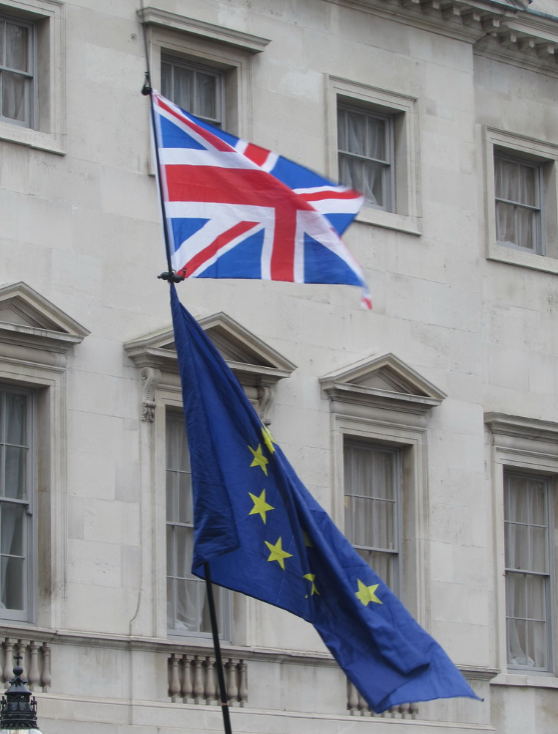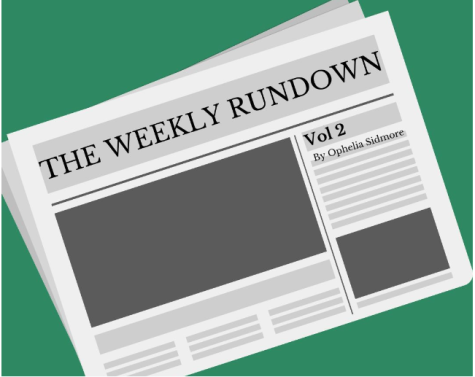Breaking down Brexit
The British flag waves beside the flag of the European Union in the United Kingdom.
America’s favorite ex is in trouble.
For all of those who have not been keeping up with international news, Britain has been unsuccessfully trying to exit the European Union for the past two years, a plan now widely known as “Brexit”.
Historically, Britain has kept itself at an arms reach from the rest of the European continent, both geographically and politically, ensuring that while they cooperated with their neighbors, they also maintained an air of isolation. The question of independence has been debated before but never really acted upon, seeming too extreme a choice and too much of a hassle.
Over these past few years, Britons have reentered into a lot of heated disputes over topics such as the influx of immigrants and refugees into the country, and the British-European trade relationships. As the long argued debate over whether the U.K. should remain in the E.U. rose up once again, Prime Minister David Cameron finally declared in 2013 that there would be a referendum—a nationwide vote—to finally clarify once and for all, whether or not Britain should stay in the E.U.
This was the prelude to an extensive campaign that quickly took advantage of the disagreements within the U.K., focusing on high strung issues, specifically targeting the fear of the influx of migrants being accepted into European nations around the continent.
Current World Issues teacher, Mr. Thomas Bonenfant, discusses the worrying ads and campaigns running through the country, saying that “Their whole approach, just as propaganda, was found to be using the same Nazi propaganda used in Germany, they’re just changing up a few of the pictures. But it’s almost identical to some of the posters and advertisements that they were using in their own country during the 20s, 30s, and 40s.”
Many British citizens still consider the referendums untrue to British opinions, as the incredible complexity of the issue could not be properly explained to voters. Not knowing what one is voting for in the long term tends to deter voters from visiting the polls. Most accuse lawmakers of leaving this decision up to the citizens instead of doing their jobs and studying the effects Brexit would have on the people they represented and voting in their place.
The Host of Last Week Tonight and British comedian John Oliver compared the issue to a doctor’s visit. If you went to your doctor with stomach pains and he said, ‘Well what do you think? Should your appendix leave or remain?’ You’d probably tell him that that’s his job to know, not yours. The same is true of government representatives—you elect them to make decisions to represent you.
Either way, on June 23, 2016, the citizens of the United Kingdom went to the polls to vote on the Brexit referendum, concluding the vote with 51.49 percent of the nation voting to leave the European Union.
Then on March 29, 2017, the new Prime Minister Theresa May triggered Article 50, the article that would begin the official process of Brexit and began negotiations with the E.U. The original plan was for the U.K. to officially leave the Union by March 29, 2019, two years after the process began.
However, this is where the timeline begins to get rough.
Complications in negotiations have caused the E.U. to grant the British government two extensions on their Brexit deal, currently putting the deadline on October 31, 2019, for Britain to leave the E.U. with or without a deal.
Now, you may ask, what in fact are the deals that everyone is discussing?
With the withdrawal of the U.K. from the E.U., there also comes the renegotiations of thousands of trade deals. Negotiations that could end in either a complete cut off of Britain from the E.U., or a softer Brexit with more compromise to E.U. laws. One of the most critical topics to negotiate is the Irish backstop.
The Irish backstop is the dispute over how to Brexit without putting a hard border between Northern Ireland and the Republic of Ireland and causing a return to the violent events of The Troubles or the Bloody Sundays.
Simply put, there can never, ever, be another solid border between the two countries, lest they risk armed conflict once again. Everyone agrees on this.
However, Brexit would lead to just that, demanding a hard border between the nations unless Northern Ireland was to joing the Republic. Many U.K. Members of Parliament (MPs) insist that they must Brexit with Northern Ireland or not at all, causing a non-negotiable hurdle to be thrown into these already nightmarish negotiations.
For now, the British Parliament is being led by Boris Johnson, the new Prime Minister instated after Theresa May’s resignation. Boris Johnson was a prominent advocate for Brexit in the early days and was a part of critical misinformation campaigns that promoted leaving the E.U.
Johnson is a hardline Brexiteer who has stated that he is determined to leave the European Union by October 31, with or without a deal in place. This led to him shutting down Parliament for roughly a week in order to prevent MPs from his opposing parties to negotiate a weaker Brexit deal without all the ideals Johnson preaches.
Boris Johnson’s plan has been interrupted just in time though, as the British Supreme Court has deemed his suspension of Parliament illegal, and officials are flooding back into work to try to negotiate a deal to prevent the disaster of a no-deal Brexit.
John Oliver described the issue saying that “ While some of what will happen in a no-deal scenario may go into the category of manageable annoyances, there are some genuinely alarming issues like ‘Will there be a shortage of medication that comes from other countries?’”
A no-deal Brexit would also mean that a hard border would be put down in Ireland and a huge economic downturn in U.K. markets would occur with a sharp loss of foreign imports, risking an economic depression that could have global effects.
Currently, Parliament has deemed it illegal for the U.K. to Brexit without a deal, leaving Johnson’s reckless determination in a gray space of legal consequences, and it is frankly not helping the accumulating panic as Britain hurdles closer to its deadline.
As a last-minute resort, the E.U. is ready to extend Britain’s deadline until January 2020, and with their nation’s future at stake, British citizens are holding their breath, waiting to find out the fate of their beloved Britain.
















